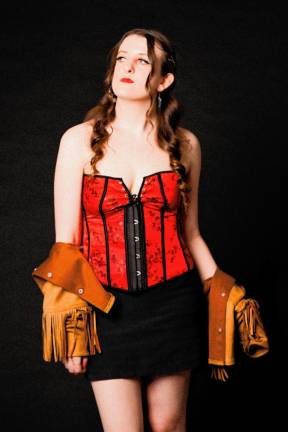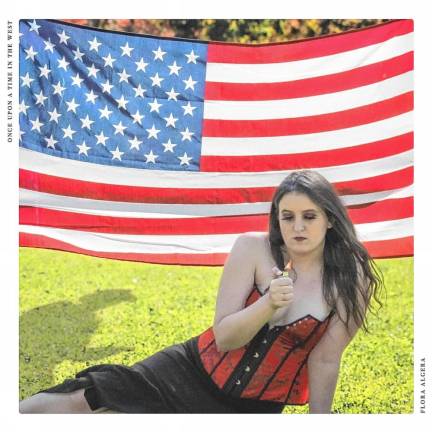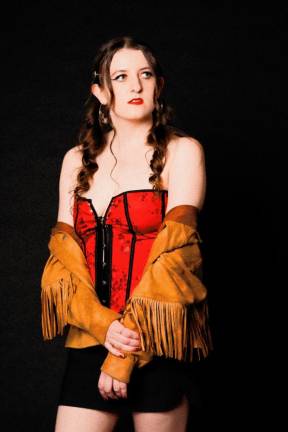


Stefani M.C. Janelli talks to Flora Algera, an alternative indie artist from Massachusetts, about her musical journey, literary inspirations and the mental health crisis before her show Friday, Aug. 16 at the Stanhope House.
Question: You first picked up a guitar in a rehabilitation facility. Can you tell us a little bit about how and why your musical journey began?
Answer: My musical journey began much earlier, but my journey writing as Flora Algera certainly began in the treatment center. It was 2020, right before the pandemic, and I was in a trauma residential in Illinois. I just turned 20 years old and I was experiencing so much emotional suffering. I struggled to open up to my therapist. I could barely make sense of it myself - it was all so unprocessed. We couldn’t use our phones or the internet, but there was an acoustic guitar that had been donated to our unit, so I would ask the staff to print me out chord fingerings and I began to play it just to quiet my mind. Since I was doing it every day, one day it just clicked and I was coming up with my own simple chord progressions and humming melodies on top. Then, I started taking poetry I’d written and putting words to the melodies. I didn’t intend to do anything with the songs. I would sing them for my individual therapist to start a dialogue. But the women in the treatment center started listening to me and encouraged my writing. They came in to sit and hear my songs, and they were my first fans. I actually sort of had my first “show” at that place - I’d written a whole album by the end of my time there and I played it in full for them. They were so supportive and amazing.
Q: You’re also a poet and have traveled around the country writing poetry. Where do you draw your biggest inspirations from? Was there any particular state or city that was your favorite to write in?
A: Yes, I love poetry. Emily Dickinson is my favorite, but I also loved reading Edgar Allan Poe when I was quite young, which I think shows in my darker style of writing. I have been a huge admirer of Lana Del Rey, especially since my later teens, and when I was 19, I spent several months traveling around the country and road-tripping with my then-boyfriend. I was inspired by Lana’s themes of nostalgia and Americana, and I took to my notebook to write my own poems. We spent the most time in Prescott, Arizona, so most of my writing came out there.
Q: How do you feel your poetry affects your songwriting?
A: They completely influence each other, and I love it. Sometimes I write a full poem before I even consider turning it into a song, and I am tasked with structuring a rhythm and melody around the words. Other times, I write a full melody with a rhythm and need to find the right words to fit the structure and mood of it. Sometimes it is a blend of the two. Having a love for both the music and the writing that is separate but can be combined is something I am proud of - I never want to feel like I am forcing a melody or lyrics. I’d rather just keep it as a poem if it doesn’t fit right.
Q: You’re also a former opera singer. How has that style of singing and training affected the way you craft songs and your overall musical stylings?
A: I think there is no way it does not contribute to my artistry today. I have been told that I write very unique melodies for my genre, and I think this is at least partly because I was exposed to such rich and expansive melodies in my dedicated study of classical music. I also feel that my vocal training has put me in a unique boat as a singer. I am not a belter, and so I am forced to find creative ways to convey emotions beyond volume that are less common for the styles I write in. I have a very soft spot in my heart for opera, and I hope to contribute to keeping the art form alive and passing it along to the next generation.
Q: Your artist name and alias, Flora Algera, is based on the short story “Flowers for Algernon” by American author Daniel Keyes. What does this story mean to you? Do themes from this story ever appear in your music?
A: I first read this book in my freshman year of high school, and it left such an impression on me that it has crossed my mind almost every day since. Like a melody I need to write, I could not get it out of my head. I knew that I wanted a meaningful artist name for my original music, and when I thought about how I wanted to structure my albums around films and my songs like poems, I figured I may as well name myself after a novel. I felt like “Flowers for Algernon” summed up the message of my artistry - Charlie in the story wishes for Algernon to receive flowers and know that he is not alone in his suffering, and I wish to leave music for those who need it. I have only explicitly referenced the book in two songs I have written, and (for now) they remain unreleased.
Q: Your first single from 2022, “Anthem for the Psych Ward Kids,” spotlights the mental health epidemic among young people today. Can you tell us about your debut track and the story behind it?
A: I think it’s very important for my artistry to feel authentic to me and that I’m always making something that I would want to hear myself. So when I wrote “Anthem,” though I was really nervous at first to release something that felt so revealing and personal, I also knew that it was something I would have wanted to hear. I used to listen to Twenty One Pilots in treatment, and I always felt very seen as a musician struggling with my mental health to know that Tyler Joseph could speak so openly about making it to the other side of his struggles in his lyrics. It felt like the natural song to make my debut.
Q: In January, you released your debut album, “Once Upon a Time in the West.” What inspired this record?
A: The film of the same name, directed by Sergio Leone, is certainly a huge inspiration for the record. Also, the political polarization of this country, the increasing reliance on technology and the mental health epidemic were all reoccurring themes I was exploring lyrically and felt I could tie into a concept as I was finding my voice as a songwriter. I was very intrigued by the idea of comparing the isolationist, ‘fend-for-yourself’ mindset of the modern world to the Old West.
Q: Almost all of these songs are more than three minutes, featuring even a seven- and eight-minute-plus track. Were there any specific influences for these longer songs?
A: Yes. I like listening to long songs. Artists and bands like Queen, King Crimson, Swans and (again) Lana Del Rey were some of the influences for that decision.
Q: On Friday, you’ll be performing at the Stanhope House. What are you most looking forward to?
A: I am so excited! This is going to be a very special show for me. We have New Jersey local Ron Solemn opening, whose most popular track “Bodybags” was also written to spread awareness of mental health issues. For that reason, the two of us have decided to raise funds for the 988 Suicide Lifeline, a cause very near and dear to my heart. I hope we can fill the space as much as possible. If you are local to Stanhope, please come check us out!
Q: What songs can we expect to hear?
A: I plan to play many tracks off my debut record, a surprise cover, a brand new song and, of course, “Anthem for the Psych Ward Kids.”
Q: What’s next for Flora Algera?
A: I’m currently recording music that I am so incredibly proud of. I can’t wait to share it. I also have some really cool video projects I’ve been working on. Besides that, just playing out and trying to connect with listeners as much as possible - you can find me on social media to stay updated.
